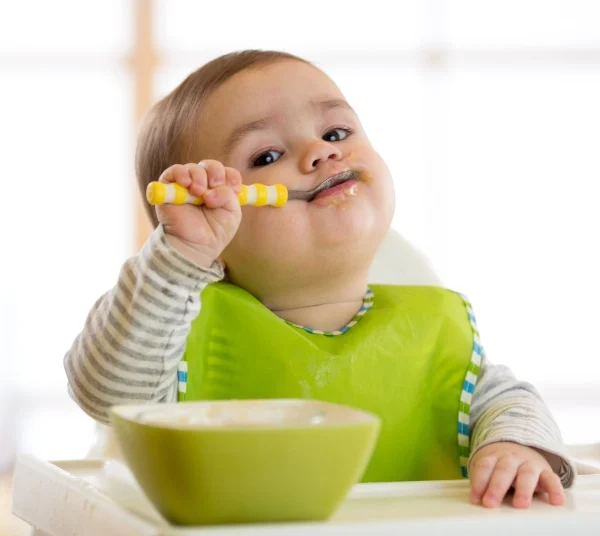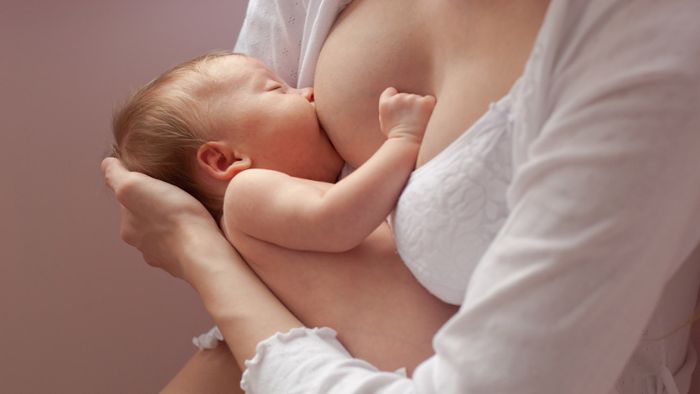There can be many reasons behind vomiting of a baby. While in most of the cases vomiting is harmless for babies and are sorted out without any medications, it might also be a symptom of some other illness, when particular treatment might be essential. So, no matter how scary it might seem to you or to your baby as a new experience, it is rarely something to panic, particularly if it is less than 24 hours since the problem has started. Read on to find more vital information about vomiting in babies and how to deal with it.
The reason of vomiting in babies
If your baby is vomiting there can be more than one reason for it and in normal cases, taking a bit more care about the reason will sort out the problem automatically. The reasons that can propel a baby to vomit includes,
Problems with feeding
The most common reason of vomiting in babies is feeding problems. Overfeeding or an allergy to the formula milk or even breast milk can trigger vomiting. The wrong way of feeding the baby is also a common cause of vomiting in babies. If your baby is vomiting right after having his food, most probably it is only because of a problem in feeding.
An infection
A viral or bacterial infection in the body can also work as the root cause for frequent vomiting in babies. Infection in the respiratory tract, congestion in the throat, anything can trigger vomiting in babies. If your baby has got a cold or has recently recovered from flu, vomiting is quite usual. A stomach infection is the other common reason of vomiting for a baby. If your baby is having diarrhea, abdominal pain or loss of appetite along with frequent vomiting, the stomach infection is most expected to be the main culprit here. An ear infection, urinary tract infection or sore throat can also make a child to vomit frequently.
Motion sickness
If your child is vomiting right after or while traveling in a car or bus it might be nothing more than motion sickness. The problem will automatically sort out once you reach the destination with your baby and he gets a good rest.
Crying
Crying for a long time can trigger gag reflex in babies making him to vomit. However, it is nothing serious and there is no reason to be worried if your baby vomits while crying.
Repeated bouts of vomiting in babies can also occur in case of consumption of poisonous substances and a condition called pyloric stenosis, but it is quite rare.
Know the difference between vomiting and spitting up
For new mothers it is really important to be able to understand the difference between vomiting and spitting up though they might look similar at first. Spitting up is very common and rather usual in babies and you really need not to be concerned about it.
When a baby spits up, the foods come out effortlessly without bothering the baby and he might not even notice it. Gurgling up of the content of the stomach into the throat is a common reason of spitting up in babies. The baby might have also swallowed air while eating and while the air comes out as a burp, some liquid can also come out with it. Spitting up is more common right after having a meal.
On the other hand, during vomiting, the food is thrown out forcefully by the stomach muscles causing discomfort and distress to the baby. Your baby might actually start crying after vomiting or look tired. The amount of vomit will also be much more than a normal spit up.
What to do if your baby is vomiting?
If your baby is vomiting, in most of the cases you really need not to do anything special. It will stop on its own and babies are quite good at dealing with it. However, in order to make sure that your baby is comfortable and feels better you should keep the following in mind. When he is vomiting it is best to keep him in an upright position. So, that the thrown up food comes out more effortlessly and the chance of choking on the vomited food is also reduced.
Put him to sleep on a flat surface, without any elevation on the head or cushions around. If your baby has started taking solids, it is best to not to give him anything solid for the next 24 hours, just to make sure that his stomach gets enough time to adjust. When your baby is vomiting make sure to give him enough fluids.
How to prevent dehydration in babies after vomiting
Even if your child is vomiting frequently he might not actually develop symptoms of dehydration. However, not developing any acute symptom does not mean that his body is not at least partially dehydrated. So, if your baby is vomiting frequently, make sure to give him enough fluids. Instead of giving him plain water, give him electrolyte solution which can be most helpful for treating dehydration. Always consult a doctor about the electrolyte solution and the dosage.
In case of serious dehydration you might see your baby becoming inactive, mouth drying, crying without tears, decreased urination, dry lips and in such cases call for emergency service immediately. Giving your baby fruit juices to prevent dehydration from vomiting is not a good idea as it might upset the stomach, triggering more frequent bouts of vomiting.
Also do not feed the baby the electrolyte solution immediately after he has vomited. Give him 10-15 minutes of rest time before you give him the fluid. Also do not feed him the total electrolyte solution at one go; give him small amounts of it through spoon at frequent intervals.
How to prevent babies from vomiting or spitting up
While you cannot always prevent the causes of vomiting in babies, you might be actually good at preventing spitting ups. Feeding your baby slowly and in smaller amounts can always help with the problem of spitting up. Making him burp after feeding can also be really helpful to prevent spit ups in babies. Do not rock him in your arms or chair right after feeding and also do not put him to sleep immediately after a meal. If your baby is vomiting due to motion sickness, it is best to arrange multiple stops in your journey. This will minimize the vomiting.
There is blood in my babies vomit, is it serious?
A tinge of blood or even a bit of fresh blood in the vomit of your baby is usually nothing to worry about. In the force of vomiting some tiny blood vessels of the esophageal lining can easily tear up, lining the vomit with a hint of blood. You might also find some fresh blood in the vomit of your baby if he has swallowed blood from a mouth cut or nose bleed in the last six hours. However, if you notice blood in the vomit of the baby repeatedly or an increase in the amount of blood coming out with the vomit, call for emergency services right away.
When to call a doctor
While vomiting is usually pretty harmless in babies it is necessary to get immediate medical help in certain cases. If your baby is vomiting frequently for more than 24 hours, it is best to not to delay and to call his doctor immediately. If your baby is less than 3 months old and has a fever (rectal temperature of over 100.4 degree Fahrenheit) and he is vomiting repeatedly, get medical help as soon as possible.
In case there are symptoms of dehydration or the baby is unusually fussy or lethargic then too getting immediate medical help is important.





